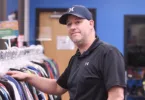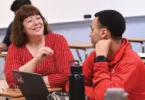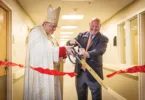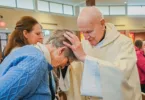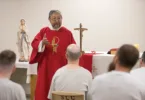
During a REACH session geared to helping Bishop Ward students hone their interview skills, students introduce themselves to mentors before answering an interview question. PHOTO BY JILL RAGAR ESFELD
by Jill Ragar Esfeld
jill.esfeld@theleaven.org
KANSAS CITY, Kan. — It looks like speed dating.
The library at Bishop Ward High School in Kansas City, Kansas, is alive with chatter, as juniors and seniors engage in one-on-one interviews.
Students jump up every few minutes to move to the next questioner.
The room is a blur of introductions, handshakes, laughter and serious discussion, followed by more of the same.
But clearly this is not speed dating.
Those questioning the students are sage business professionals, and their queries are hardly what you would ask a potential date.
“What are you looking for in a college that you think will bring you success in the future?
“How are you planning to fund your education?”
This is speed interviewing, part of the Rotary Club REACH Program.
Students are learning how to make a good first impression and think on their feet as they give quick answers to questions they may be asked by college administrators or potential employers.
With resumes in hand, seniors are talking about why they should be accepted into a certain college, and juniors are practicing applying for summer jobs.
They’re all building confidence that will help them excel at interviews in real life.
College is for you
David Anderson, a member of the Rotary Club of Leawood, oversees the REACH program at Ward. The acronym stands for Rotary Encouraging Academic Collegiate Help.
The program started 12 years ago when then-president Father Michael Hermes asked the Rotary Club for help getting students to college.
“And he designed a program that is true to this day,” said Anderson.
The program is based on mentorship.
Each Rotary Club member volunteering for REACH is matched with a student at the beginning of the junior year.
“The mentors get to know the kids and the parents,” explained Anderson. “And then they guide them through two years to graduation.”
“They’re working with students who probably will be the first generation in their family to go to college,” added Bishop Ward principal Karen Hopson. “So, the parents don’t have that experience.
“And the process is daunting.”
Rotary Club member Ron Slepitza knows better than anyone how daunting the process can be.x
He is the president of Avila University in Kansas City, Missouri, and intimately involved in running the REACH program.
“If there’s a bump in the road to college,” he said, “it’s too easy to say, ‘Well, college isn’t for me.’
“What we want to do is dispel that. College is for you. You can overcome bumps in the road and be successful.
“And if you don’t go to college, we may miss the gifts and talents you bring to the world.”
A curriculum for success
Mentors and students meet during lunch once each month throughout the school year. They eat and work together.
REACH has a structured curriculum perfected over the years that helps juniors prepare for applying to college and seniors select a college and go forward.
The curriculum includes guest speakers and workshops on everything from finding scholarships to ACT prep to resume writing.
Former REACH students visit and share their success as well as what they would do differently, based on their experience.
Not to mention the discussions of faith.
Slepitza has talked about his university’s namesake, St. Teresa of Avila.
And Bishop Ward president Father Thomas Schrader, OCarm., has lectured on both St. Teresa of Avila and St. Thérèse of Lisieux.
“I talked about their experience and how faith helped them prepare for their journey and ultimately for sainthood,” he said.
Students also go on field trips to college fairs and perform community service with their mentors.
“We have our own counseling department,” said Father Tom. “But this is like an extra layer of support.
“It is about good people serving the community and caring about students who are first generation applying to college.”
An extra hand up
All the students who have entered the REACH program have ended up in college.
But for many from this urban core community, college can be a financial challenge.
That’s why a part of the REACH curriculum involves helping families with paperwork, and helping students research and apply for scholarships.
“Last year,” said Father Tom, “we had a graduating class of 94 and they were offered $2.6 million in scholarships.
“And that’s not financial aid — that’s scholarships.
“That’s kind of a big deal.”
In addition to helping students identify and apply for scholarships, the Rotary Club provides two scholarships of its own each year to two outstanding REACH graduates.
“We have Rotary members that are on a board outside of REACH who select these students,” said Anderson. “Each [scholarship] is worth $1,500 a year for four years.”
The scholarships are presented at an end-of-program banquet where graduating students are given one last boost of support from their mentors.
“They have a nice going away party for them,” said Father Tom. “They give them gift certificates and little things at the end — for their dorm rooms, to help them transition.”
Building bridges
REACH is successful because students enter with high potential to accomplish their goals — they just need support from someone who knows how to navigate the system.
Ursula Charbonneau, a graduate of Bishop Ward, who now heads its social studies department, is responsible for finding students who might benefit from that support and helping match them with mentors.
“In the spring, I’ll look at the GPAs of sophomores,” she said. “I’ll select from the top echelon of students and I’ll invite them for an interview.”
During the interview, students fill out brief demographic data and Charbonneau determines if they are a good fit for REACH.
Charbonneau sees the great work mentors do in helping students get to college. But she also sees a bigger picture.
“You have [in the Rotary Club] a service organization in Leawood, which is a very different world from here,” she said. “And you have these people leaving that world, getting out of their bubble, coming here and getting a little exposure for themselves.
“And for our students, it works the opposite way as well.”
Charbonneau sees the connections being made between these vastly different demographics as an important byproduct of REACH.
“Yes, we do some academic stuff,” she said. “And, yes, we help kids get to college, and REACH gives scholarships which help financially.
“But for me, I think the bigger piece is we’re building bridges across communities.”
A holy activity
The REACH program has its roots in the Rotary Club motto: “Service above self.”
“I think each one of our members finds this ‘service above self’ with these kids,” said Anderson. “We watch them grow up and graduate and have scholarships and go to college and become something.”
Though the Rotary Club is a secular organization, many of the Leawood Club members are Catholic and their faith plays an important part in their mission of service to the community.
“Anytime you can get people interacting with each other and understanding each other and understanding each other’s perspective,” said Slepitza, “you’re involved in a holy activity.”
And that holy activity often continues after students have gone off to college.
“I’d say a pretty big chunk of [the students] have stayed in touch with their mentors because their mentors had an impact on them,” said Charbonneau. “They want their mentors to stay apprised of their progress.
“And when mentors get letters from kids, they’re over the moon.”

